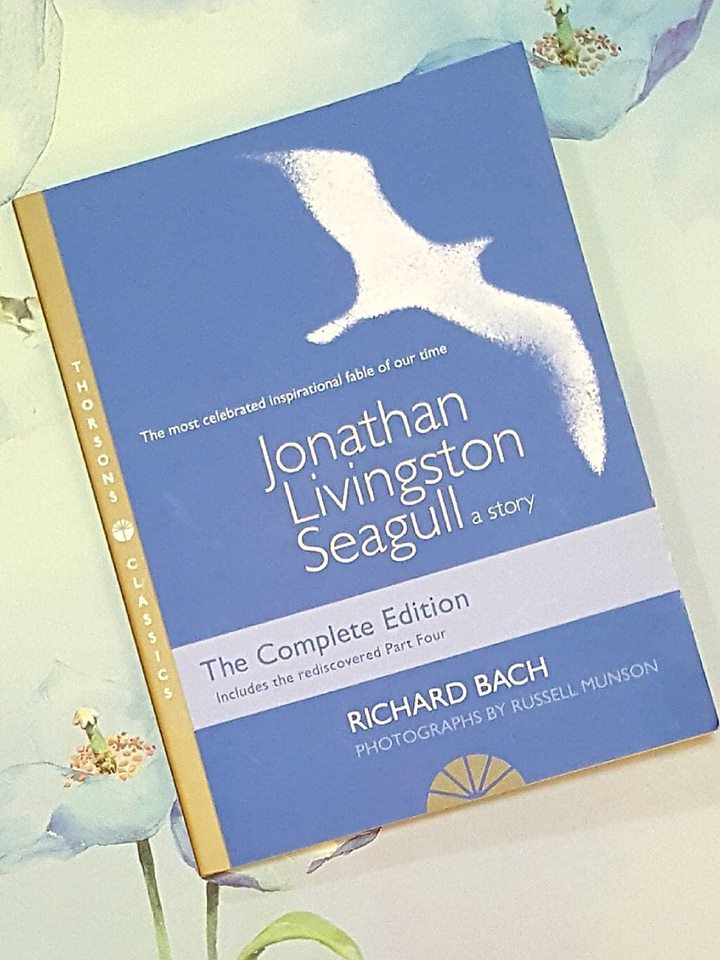
Richard Bach is an American writer who has written many flight-related works. One of his most notable works is the fable, Jonathan Livingston Seagull, which contains a lot of Bach’s philosophy and deeper thoughts. Bach believes that ‘our apparent physical limits and mortality are merely appearance.’
I read this book in October when it was recommended to me by a friend. I had been forewarned that it was a fable with spiritual undertones, so I went into it with an open mind. I don’t know quite what I was expecting, but I wasn’t expecting what I got. This short story/fable is split into four parts, each part seems to represent a different level of inner understanding. In some ways it reminded me of Buddhism and how Buddhists meditate as a means to enlightenment, but I discovered there were many parallels to religion throughout the story. Fortunately it is not done in a preachy ‘you are condemned’ sort of way, it is more metaphoric.
SPOILER ALERT!
*****If you haven’t read this book yet and would like to read it without spoilers then stop reading this blog now*****
Jonathan Livingston Seagull tells the story of a Seagull who, unlike the rest of his flock who are content to fight over food, loves to spend his time experimenting with flight. The higher and faster he flies the more his flock disapprove of his behaviour. Even when Jonathan discovers a way to obtain better food, the flock will not listen to him. Eventually the flock banish him and Jonathan lives out a life in solitude. At the end of Part One, two ‘starbright gulls’ appear and take him ‘home’. He rises into the dark sky and disappears.
In Part Two Jonathan believes he is in heaven but he finds himself in a place very similar to the place he has just left. His body glows bright and he can fly faster but he discovers that he still has limits. In this new place he finds himself amongst gulls who share his passion for flying and even has an instructor. Jonathan learns how to manipulate space and time, ‘flying at perfect speed’. He essentially learns how to teleport and his instructor tells him to learn the meaning of kindness and love. Jonathan decides he must go back to his flock on Earth, to see if there are any new gulls who wish to learn to fly as he does. He returns and begins to tutor a new gull who has been outcast from the flock. This part, I thought, is very reminiscent of the idea of Jesus being reborn.
In Part Three Jonathan gains more and more outcast students, and he tries to teach them everything he learnt from his previous instructor. However he finds that his students are much more interested in practising flying rather than thinking about flying and what it means. They return to the flock and even though they are ignored, they carry on practising. When Jonathan appears to fix a gull’s wing, enabling this gull to fly, more from the flock come to listen to Jonathan’s teachings. Again, this is very reminiscent of the idea of Jesus healing a paralysed man. The flock begin to fear and idolise Jonathan and Jonathan decides that he will leave and allow one of his student’s to carry on his teaching.
In Part Four Jonathan’s students carry on his teachings but eventually they pass on to the next life and they become saint-like figureheads for the flock. Less and less gulls are interested in practising flying and are more interested in recalling what Jonathan said word for word. They call Jonathan’s students ‘Great Gulls’ and Jonathan ‘Divine Gull’. As time passes the flock begins to make up rituals and sermons in order to honour Jonathan and his students. Some of the flock begin to believe the Jonathan is just a myth and never really existed at all. At the end of Part Four the majority of the flock do not fly for fun anymore but one gull does fly, and as he experiments with the joy of flying, Jonathan appears for him and offers to teach him more.
As you can probably tell and as I have noted, Bach’s fable has many religious metaphors and spiritual messages. As I read Jonathan Livingston Seagull I found myself thinking that the fable managed to illustrate perfectly what has happened to all the religions on Earth. Through seagulls and flight Bach has shown how easy it is for one individual, through practise alone, can appear to do impossible things and rise to the top of the social ladder. Bach also shows how well-intended teachings are forgotten or twisted by others over time into something completely different.
I enjoyed reading this fable, and every time I put it down I found myself picking it back up again. There are many hidden meanings and metaphors throughout and I feel that you will probably notice something new every time you re-read it. Jonathan Livingston Seagull is a thought-provoking read with a surreal, fantastical storyline. It is similar to other short and philosophical stories like ‘The Little Prince’ and ‘The Alchemist’. I would recommend this book to everyone, it is a short story and it won’t take you very long to read it.